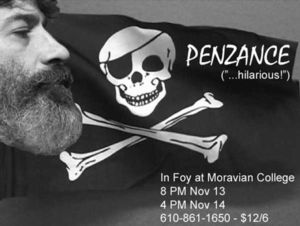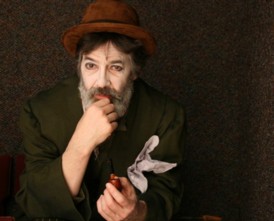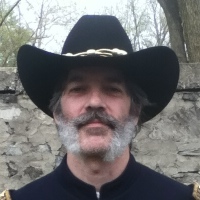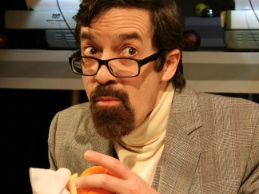Being a lowly college professor at a small liberal arts college, and in the sciences to boot, means that I don't have any personal life to speak of. Well, actually I have a wonderful personal life (Hi, honey!) — it's just that a lot of it is spent here at the College.
Here are a few of the things that I'm interested in, in one way or another.
theater

I've been involved in theater off and on since high school, acting and tech mostly, though I directed A Midsummer Night's Dream in college. A bit more acting after college and in graduate school, then nothing for the long, dark years of my post-docs and early years here at Moravian. (Some would call them the Thankful Years. Philistines.) My wife and I have been long-time subscribers to Moravian's theater productions, and have greatly enjoyed roles as audience members.

Then in November of 2004 I returned to the boards as the Pirate King in the Music department's staging of The Pirates of Penzance. The next fall (2005) I played Jacob Engstrand in the College's production of Ibsen's Ghosts. Highborn criminals and lowborn criminals: any wonder I take a dim view of humanity? Or perhaps my view led to the casting….
Skip ahead to the spring of 2009. Prof. Christopher Shorr, the new head of the Moravian College Theatre Company, mounted a production of the rarely-staged Oedipus of Seneca, which is not the more familiar Oedipus Rex by Sophocles. I was fortunate enough to be cast as Creon; the whole show was a blast, and very, very cool. (Photo credit: Erin Martin, 2009)


That fall Alanah Cervantes, a student here at Moravian, began rehearsals for Samuel Beckett's Waiting for Godot. I auditioned and got the part of Pozzo, the bullying, insecure purveyor of bombast who serves as a foil for the other players. The curtain went up in mid-February, and our short run went very, very well. As was true for Oedipus, the whole experience was great, although having a larger part with a lot more disconnected "dialog" was a much greater challenge than I had counted on. (Photo credit: Christopher Shorr, 2010)

In the spring of 2012 I was fortunate to be part of a wonderful community theater project with Touchstone Theatre, a commissioned work called A Resting Place. The play commemorated the 150th anniversary of the Civil War, and I played William Doster, a Union general from Bethlehem.

One year later I got to play the self-absorbed, hedonistic bureaucrat Mašat in Vaclav Havel's The Memorandum. Selected by Christopher Shorr to commemorate Havel and celebrate Moravian's connection with the Czech Republic (and Havel's visit to Moravian), it was the closest thing to a (pure) comedy I've ever done, and a lot of fun; the very talented and enthusiastic cast overcame seemingly ceaseless confrontations with the flu to put on a great show. (Photo credit: Christopher Shorr, 2013)
baking
Sugar, fats, carbohydrates; follow the instructions carefully and you're all but guaranteed a rewarding outcome (contrast this with scientific research) — what's not to like?
aikido
Until I came to Moravian I practiced aikido, a Japanese martial art. I began while living in Japan in the late 1980s, then continued on Long Island and in Nashville. Aikido comprises many different styles, but differs from most martial arts in its emphasis on peaceful resolution of conflicts. It tends to attract a more mature student than other arts, which are sometimes plagued by hormonally-challenged males. Aikiweb is an excellent web resource for pretty much anything aikido.
Japan
My interest in aikido began while I was living in Japan; I spent three years in Tsukuba after getting my Ph.D., continuing my research into bacterial motility. I greatly enjoyed my time there, and it was in many ways a defining period in my life. I highly recommend that you visit Japan if you get the chance. It's a wonderful country, very friendly and accommodating, and at the same time indescribably foreign.
nanotechnology
One of my interests is in nanotechnology, the rapidly-developing ability to manipulate matter at the atomic level; this technology promises to fundamentally alter every aspect of life on Earth. Truly mind-blowing stuff. Nanotechnology was first described by K. Eric Drexler, in his book Engines of Creation (now freely available from that site). Although it's now over 30 years old, I highly recommend Engines for an awesome (and yes, I know the proper meaning of the word) introduction to the future.
The Foresight Institute is an organization of people dedicated to the development of all aspects of this technology, and their website is a good place to start if you're interested in learning more about it.
fish
My wife and I have a couple of aquaria at home, with a few different fish species; mostly cherry barbs right now, with an angelfish and an algae-eater to keep up appearances. I take care of the department's aquaria (one 30-gallon and one 75-gallon, in room 311 and the greenhouse, respectively, of the Hall of Science) and I also have a couple of small tanks in my office, home to two single Betta splendens (a.k.a. "Siamese fighting fish"). I've bred several generations successfully, and am trying to do so again. Think of it as piscine gardening.
music
Although I don't have time to do much reading for pleasure any more, I still manage to listen to music. Some of my favorite artists are the Austin Lounge Lizards, Melissa Etheridge, Joe Jackson, Lyle Lovett, Kim Richey, Stan Rogers, Michelle Shocked, Bruce Springsteen, Suzanne Vega, and Webb Wilder.
I also enjoy the genre currently called "Americana." There are several excellent podcasts which focus on this music, including The Miller Tells Her Tale. Richard Taylor's roots rock/americana podcast, called Roots Rock Radio is also excellent, albeit infrequent.